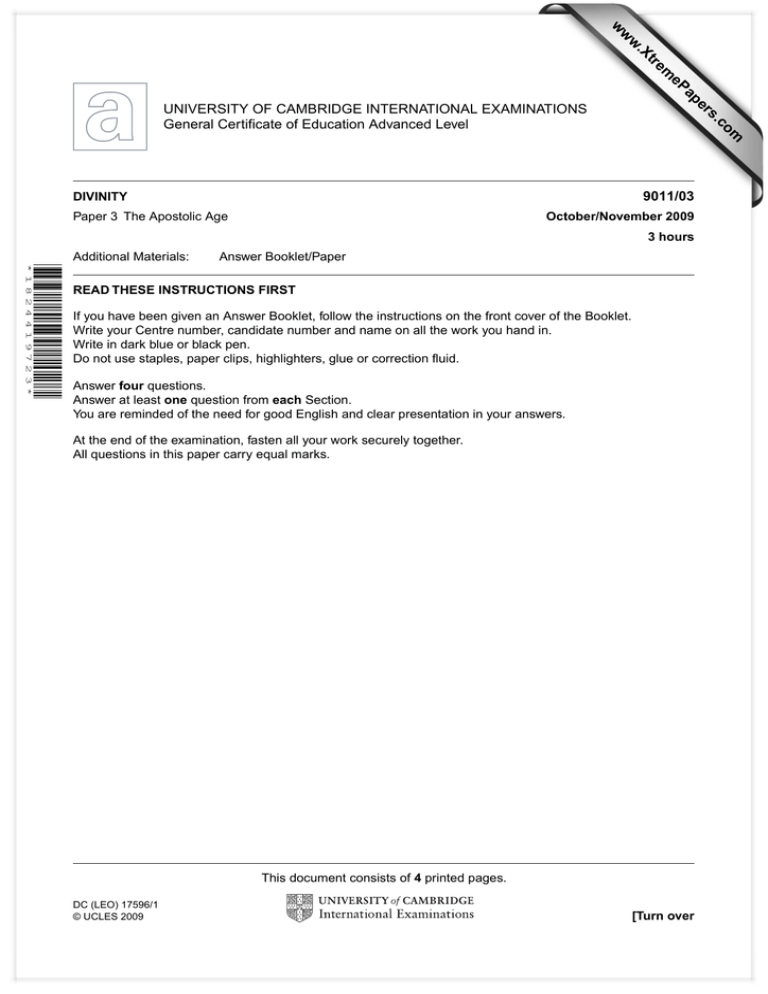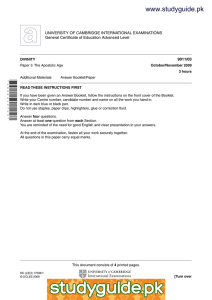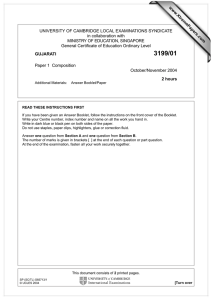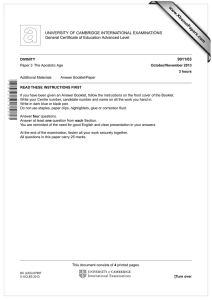
w
w
ap
eP
m
e
tr
.X
w
om
.c
s
er
UNIVERSITY OF CAMBRIDGE INTERNATIONAL EXAMINATIONS
General Certificate of Education Advanced Level
9011/03
DIVINITY
Paper 3 The Apostolic Age
October/November 2009
3 hours
Additional Materials:
Answer Booklet/Paper
*1824419723*
READ THESE INSTRUCTIONS FIRST
If you have been given an Answer Booklet, follow the instructions on the front cover of the Booklet.
Write your Centre number, candidate number and name on all the work you hand in.
Write in dark blue or black pen.
Do not use staples, paper clips, highlighters, glue or correction fluid.
Answer four questions.
Answer at least one question from each Section.
You are reminded of the need for good English and clear presentation in your answers.
At the end of the examination, fasten all your work securely together.
All questions in this paper carry equal marks.
This document consists of 4 printed pages.
DC (LEO) 17596/1
© UCLES 2009
[Turn over
2
Section A
Answer at least one question from this section.
If you choose question 1, answer in one version only.
Romans and James
REVISED STANDARD VERSION
1
Comment on points of interest or difficulty in four of the following, with brief reference to the
general context:
(a) They show that what the law requires is written on their hearts, while their conscience also
bears witness and their conflicting thoughts accuse or perhaps excuse them...
(Romans 2:15)
(b) That is why his faith was “reckoned to him as righteousness.” But the words, “it was reckoned
to him,” were written not for his sake alone, but for ours also.
(Romans 4:22-24a)
(c) For the mind that is set on the flesh is hostile to God; it does not submit to God’s law, indeed
it cannot; and those who are in the flesh cannot please God.
(Romans 8:7-8)
(d) ...they were pleased to do it, and indeed they are in debt to them, for if the Gentiles have
come to share in their spiritual blessings, they ought also to be of service to them in material
blessings.
(Romans 15:27)
(e) James, a servant of God and of the Lord Jesus Christ,
To the twelve tribes in the Dispersion: Greeting.
(f)
(James 1:1)
...and the prayer of faith will save the sick man, and the Lord will raise him up; and if he has
committed sins, he will be forgiven.
(James 5:15)
[25]
© UCLES 2009
9011/03/O/N/09
3
NEW INTERNATIONAL VERSION
1
Comment on points of interest or difficulty in four of the following, with brief reference to the
general context:
a)
…since they show that the requirements of the law are written on their hearts, their
consciences also bearing witness, and their thoughts now accusing, now even defending
them.
(Romans 2:15)
(b) This is why “it was credited to him as righteousness.” The words “it was credited to him” were
written not for him alone, but also for us...
(Romans 4:22-24a)
(c) The sinful mind is hostile to God. It does not submit to God’s law, nor can it do so. Those
controlled by the sinful nature cannot please God.
(Romans 8:7-8)
(d) They were pleased to do it, and indeed they owe it to them. For if the Gentiles have shared
in the Jews’ spiritual blessings, they owe it to the Jews to share with them their material
blessings.
(Romans 15:27)
(e) James, a servant of God and of the Lord Jesus Christ,
To the twelve tribes scattered among the nations:
Greetings
(f)
(James 1:1)
And the prayer offered in faith will make the sick person well; the Lord will raise him up. If he
has sinned, he will be forgiven.
(James 5:15)
[25]
2
Analyse Paul’s teaching in Romans on the relationship between law and sin.
3
What does the letter of James reveal about the beliefs and circumstances of those to whom it was
addressed?
[25]
4
To what extent were Paul and the author of James in agreement on the doctrinal basis and ethical
principles of the Christian faith?
[25]
© UCLES 2009
9011/03/O/N/09
[25]
[Turn over
4
Section B
Answer at least one question from this section.
5
When and why was Acts written?
[25]
6
Assess the contributions made by Stephen and Philip to the development of the doctrine and
mission of the early church.
[25]
7
Discuss the role and the importance of the Holy Spirit in Paul’s ethical teaching.
[25]
8
Compare the significance of ‘the new covenant’ for the author of Hebrews and for Paul.
[25]
9
‘A sect within Judaism.’ How appropriate is this as a description of the church in the Apostolic
Age?
[25]
10 Discuss the early church’s relations with the Jewish and Roman authorities, and their understanding
of the role of the state in human affairs.
[25]
Copyright Acknowledgements:
Scripture quotations marked (RSV) are from the Revised Standard Version of the Bible, copyright © 1946, 1952 and 1971 by the Division of Christian Education
of the National Council of the Churches of Christ in the USA. Used by permission. All rights reserved.
Scripture quotations marked (NIV) are taken from the Holy Bible, New International Version®. NIV®. Copyright © 1973, 1978, 1984 by International Bible Society.
Used by permission. All rights reserved.
Permission to reproduce items where third-party owned material protected by copyright is included has been sought and cleared where possible. Every reasonable
effort has been made by the publisher (UCLES) to trace copyright holders, but if any items requiring clearance have unwittingly been included, the publisher will
be pleased to make amends at the earliest possible opportunity.
University of Cambridge International Examinations is part of the Cambridge Assessment Group. Cambridge Assessment is the brand name of University of
Cambridge Local Examinations Syndicate (UCLES), which is itself a department of the University of Cambridge.
© UCLES 2009
9011/03/O/N/09








